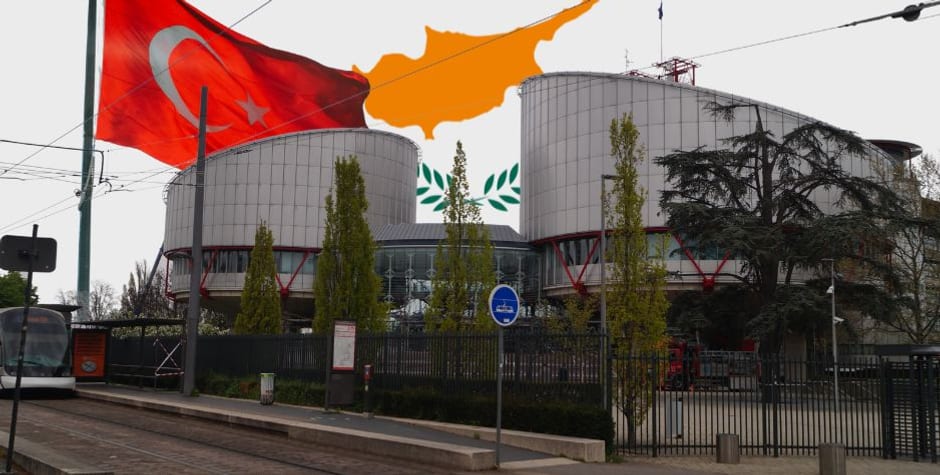

ECHR: Turkey Condemned for Excessive Delay in the Restitution of Property Belonging to Greek Cypriots
ECHR: Turkey Condemned for Delay in the Restitution of Greek Cypriots' Property
In a judgment delivered on 10 June 2025, the European Court of Human Rights (ECHR) once again condemned Turkey for the excessive delay in restitution proceedings concerning property owned by Greek Cypriots in Northern Cyprus, who were dispossessed in 1974 following the Turkish military invasion. Beneath the surface, this ruling highlights the reality of a silent persecution of Christians in areas under Turkish control — a pattern that mirrors what is happening within Turkey itself.
The Court unequivocally denounced the passivity of Turkish authorities, and the judicial paralysis imposed on Greek Cypriot victims who were deprived of their properties. This was set out in the case of K.V. Mediterranean Tours Limited v. Turkey (application no. 41120/17), decided on 10 June 2025. The applicant company, established in 1967, owns a real estate complex located in the closed-off and restricted area of Varosha, in Famagusta, within the northern part of the island currently under Turkish control. Its shareholders and directors are of Greek Cypriot origin. In 1974, following a coup attempt aimed at unifying Cyprus with Greece, Turkey invaded Cyprus under the pretext of protecting Turkish Cypriots. Around 200,000 Greek Cypriots were forced to flee the north and abandon their properties, resettling in the south. In 1983, the so-called “Turkish Republic of Northern Cyprus (TRNC)” — recognized only by Turkey — declared independence and today occupies 36% of the island’s territory. To handle the large number of property disputes, the TRNC created the Immovable Property Commission (IPC) in 2005.
In 2010, the applicant company, K.V. Mediterranean Tours Limited, submitted a claim to the IPC requesting the restitution of its property and compensation for loss of use. By 2017, due to the “protracted and ineffective” proceedings, the company lodged an application with the ECHR, with no resolution to date. The Court recognized the company’s legal ownership of the property, based on official title deeds. However, the Court noted “the IPC’s failure to act with coherence, diligence and appropriate expedition in examining the applicant company’s claim,” rendering the domestic remedy ineffective. Consequently, Turkey was found to have violated the right to the peaceful enjoyment of possessions (Article 1 of Protocol No. 1 to the European Convention on Human Rights). Turkey has been ordered to pay €18,000 in non-pecuniary damages and legal costs. However, the company’s original restitution request before the IPC remains unresolved to this day.
The Instrumentalization of Islamic Property Law by Turkey
According to the Greek Cypriot company, a central element in the deadlock lies in the involvement of a religious and historically rooted actor: the Cyprus Foundations Administration (Evkaf). This body, established in 1571 shortly after the Ottoman conquest of Cyprus, oversees the traditional Muslim religious endowments (vakıfs) registered on the island. It is the equivalent of the General Directorate of Foundations (Vakıflar Genel Müdürlüğü) in Turkey, a public institution attached to the Ministry of Culture and Tourism. Evkaf was admitted as a third party in the proceedings, claiming that many of the lands in question were in fact inalienable properties belonging to Muslim foundations established during the Ottoman Empire — specifically, the Abdullah Pasha Foundation, which it manages. By invoking Islamic property law (waqf), Evkaf is effectively blocking any attempt at restitution, reinforcing Turkish control over the occupied territory of Cyprus, and legally erasing the Christian heritage of these sites.
Once a thriving and upscale seaside resort, Varosha — where the applicant company’s property is located — was abandoned by its Greek Cypriot inhabitants in 1974 as they fled Turkish napalm bombings. The town was looted and sealed off, becoming a no-man’s-land. UN Security Council Resolutions 550 (1984) and 789 (1992) clearly state that any attempt to settle Varosha by anyone other than its original inhabitants is inadmissible, and that the UN-controlled buffer zone (UNFICYP) should be extended to include Varosha. Yet in the 2000s, Evkaf and the Department of Religious Affairs petitioned the Famagusta District Court to declare that the Abdullah Pasha Foundation owns a list of properties located in the Varosha–Famagusta region. The court granted this request in 2005.
On 9 December 2019, Ibrahim Benter, Director General of Evkaf, declared that the entirety of Varosha belongs to Evkaf. He also stated that Evkaf might lease properties to Greek Cypriots — but only if they acknowledge Evkaf’s ownership of the sealed-off city. In October 2020, the Turkish authorities began the partial reopening of Varosha, starting with its beachfront, triggering condemnation from both the UN Security Council and the European Union. In a report dated 5 July 2024 (S/2024/527), the UN Secretary-General expressed deep regret that Turkey had taken no steps to reverse these controversial measures.
Systemic Discrimination Against Christians by Turkey Ignored by the European Court of Human Rights
In the case of K.V. Mediterranean Tours Limited v. Turkey, the applicant company also alleged that it had been subjected to discriminatory treatment in the enjoyment of its right to property, on the grounds of the national and ethnic origin, language, and religious beliefs of its Greek Cypriot shareholders and director — a claim based on Article 14 of the European Convention on Human Rights, read in conjunction with Article 1 of Protocol No. 1. While the Court considered it unnecessary to rule on this complaint, the recurring pattern in similar cases leaves little doubt as to the existence of a structural and systemic practice. According to Ayfer Said Erkmen, former president of the Immovable Property Commission (IPC), the cost of compensating every Greek Cypriot for each parcel of land lost in 1974 — covering a total area of 1,400 km² — could exceed €26.3 billion. In practice, even when the IPC awards compensation, Turkey provides no funding to make those payments effective, rendering them symbolic at best.
Beyond the specific case of Cyprus, this judgment reflects a broader truth: both in Turkey and in the territories it controls, Christians continue to bear the consequences of a deliberate nationalist and religious policy of marginalization. Once persecuted, today forgotten — especially by international institutions — Christians in Northern Cyprus continue to see their identity, memory, and rights trampled, despite Cyprus having been a member of the European Union since 2004. Land expropriation is only one instrument among many in a systematic policy of erasing Christian presence in these regions. The European Centre for Law and Justice (ECLJ) regularly intervenes in cases brought before the European Court of Human Rights against Turkey, particularly concerning the restitution of properties belonging to Christian — and notably Greek Orthodox — foundations.











